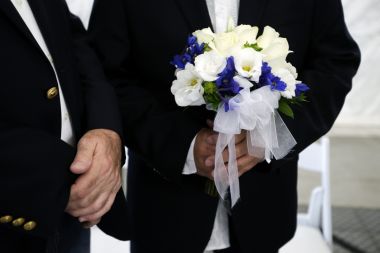Oklahoma ban on gay marriage ruled 'unconstitutional'

A federal court recently ruled that the ban on gay marriage in the state of Oklahoma is unconstitutional.
US District Court Judge Terence Kern wrote in his judgement on Tuesday: "The Court holds that Oklahoma's constitutional amendment limiting marriage to opposite-sex couples violates the Equal Protection Clause of the Fourteenth Amendment of the US Constitution."
He added that the protection offered by the fourteenth amendment "is at the very heart of our legal system".
Despite the court victory, gay marriage is still not permitted in Oklahoma as Judge Kern has opted not to enforce the judgement immediately, pending possible appeals from the Tulsa County district attorney's office, as well as a similar set of appeals resulting from a similar case in Utah.
Judge Kern's ruling only affected "Part A" of an Oklahoma Constitutional amendment, which states in part that "marriage in this state shall consist only of the union of one man and one woman". It had been adopted by referendum in 2004 with 75% of the vote.
CNN quoted Judge Kern as saying, "the Court's rationality review reveals Part A an arbitrary, irrational exclusion of just one class of Oklahoma citizens from a government benefit".
He said that those supporting the amendment "purposefully [drew a line] between two groups of Oklahoma citizens -- same-sex couples desiring an Oklahoma marriage license and opposite-sex couples desiring [a] marriage license".
The case was first brought by two lesbian couples in 2004. Susan Barton, one of the four women involved, told CNN that she is "absolutely thrilled". She and her partner, Gay Phillips, have lived in Oklahoma for more than 50 years. They have been together for the past three decades and got a civil union in Vermont and have collected marriage licenses issued from San Francisco, Vancouver, and British Columbia.
"You can't stay in this for nine years and not have faith," Barton said. "...I feel like we are already married, [but] I want our state to recognise our marriage".
District Attorney Tim Harris of Tulsa County, who represented the Tulsa County clerk, speaking in the New York Times said, "We are disappointed in the ruling." The clerk was defendant in the case because the office issues marriage licenses. Regarding any appeals, Mr Harris said: "We will need to review the decision and talk with our client."
Oklahoma State Governor, Republican Mary Fallin, objected to the ruling. On CNN she was quoted as saying, "I support the right of Oklahoma's voters to govern themselves on this and other policy matters … I am disappointed in the judge's ruling and troubled that the will of the people has once again been ignored by the federal government."
Tuesday's decision was only the third time that a US federal court has struck down a state constitutional amendment on marriage. The two others were the Utah decision in December 2013 and a 2010 ruling in California that eventually overturned Proposition 8, the ballot title being "Eliminates Rights of Same-Sex Couples to Marry".
Carl Tobias, a constitutional law professor at the University of Richmond, said on CNN that federal district judges striking at state bans "looks like a trend" that is kicking into gear in the generally conservative states of Utah and Oklahoma.
"It seems to be moving much more quickly than people thought," said Tobias.











